Recommendation Letter For Graduate Student
[Your Name]
[Your Title/Position]
[Your Institution/Organization]
[Your Contact Information]
[Date]
[Recipient's Name]
[Recipient's Title/Position]
[Recipient's Institution/Organization]
[Recipient's Address]
Dear [Recipient's Name],
I am writing to enthusiastically recommend [Student's Full Name] for admission into the [Graduate Program Name] at [Institution Name]. I have had the pleasure of supervising [Student's Name] during their time as an undergraduate student in [Your Department/Program] at [Your Institution] and have been consistently impressed with their dedication, intelligence, and passion for [Student's Field of Study].
[Student's Last Name] was a standout student in my [Your Course Name] course, where they consistently demonstrated a deep understanding of complex concepts and an ability to apply theoretical knowledge to practical scenarios. Their insightful contributions to class discussions and collaborative projects greatly enriched the learning environment for both their peers and me.
One of the most remarkable qualities that sets [Student's First Name] apart is their exceptional work ethic. They consistently went above and beyond the requirements of assignments, often conducting additional research to enhance the depth and breadth of their projects. This commitment to excellence and their willingness to explore beyond the classroom's scope demonstrate [Student's First Name]'s potential to excel in a rigorous graduate program.
In addition to their academic prowess, [Student's First Name] possesses excellent communication skills. They are articulate, engaging, and capable of presenting complex ideas in a clear and concise manner. Their ability to convey their thoughts effectively is a testament to their strong analytical thinking and their potential for contributing meaningfully to academic discussions and research endeavors.
During their time at [Your Institution], [Student's First Name] also took the initiative to participate in [Relevant Extracurricular Activities or Research Projects]. This experience allowed them to apply theoretical knowledge to real-world scenarios and collaborate effectively with multidisciplinary teams, further showcasing their adaptability and leadership potential.
Based on [Student's First Name]'s academic achievements, dedication, and personal qualities, I am confident that they would be an exceptional asset to the [Graduate Program Name] at [Institution Name]. I wholeheartedly endorse their application and believe they have the drive and intellectual curiosity to thrive in the challenging academic environment of a graduate program.
Please do not hesitate to contact me at [Your Phone Number] or [Your Email Address] if you require any further information or clarification regarding my recommendation. Thank you for considering [Student's Full Name] for admission to the [Graduate Program Name].
Sincerely,
[Your Name]
[Your Title/Position]
[Your Department/Program]
[Your Institution/Organization]
Formal Recommendation Letter for Graduate Studies
Subject: Strong Recommendation for [Student Name]
Dear [Recipient Name],
I am writing to provide my highest recommendation for [Student Name] as they pursue graduate studies in [Program Name] at [University]. I have had the pleasure of mentoring [Student Name] during their undergraduate studies in [Field], where they consistently demonstrated exceptional analytical skills, creativity, and dedication.
[Student Name] has excelled academically, contributing to [Research, Projects, or Thesis Work], and consistently displayed leadership qualities among peers. I am confident that their passion for learning and outstanding work ethic will make them a valuable asset to your graduate program.
Please feel free to contact me at [Email/Phone] for any additional information.
Sincerely,
[Your Name]
[Title / Department / Institution]
Heartfelt Recommendation Letter for Graduate Scholarship
Subject: Recommendation for [Student Name] – Graduate Scholarship
Dear [Recipient Name],
I am honored to recommend [Student Name] for consideration for the [Scholarship Name]. Having served as [Student Name]'s advisor for [Duration], I have observed their extraordinary dedication to both academics and community service.
Their research on [Topic] reflects a unique combination of intellectual curiosity, perseverance, and practical application. Beyond academics, [Student Name] has volunteered in [Programs/Organizations], demonstrating compassion and leadership.
I strongly endorse [Student Name] and am confident they will thrive in your graduate program. Please do not hesitate to contact me for further insights.
Warm regards,
[Your Name]
[Title / Department / Institution]
Professional Recommendation Letter for Graduate Assistantship
Subject: Recommendation for Graduate Assistantship – [Student Name]
Dear [Recipient Name],
I am pleased to recommend [Student Name] for the Graduate Assistantship position at [University]. As [Your Position], I supervised [Student Name] in [Course, Lab, or Project], where they consistently demonstrated exceptional organizational and teaching skills.
Their ability to manage research projects, assist peers, and contribute to departmental goals has been remarkable. I am confident that [Student Name]'s professional demeanor and academic excellence will make them an outstanding assistant.
Please feel free to reach out to me at [Email/Phone] for additional details.
Sincerely,
[Your Name]
[Title / Department / Institution]
Informal Recommendation Email for Graduate Admission
Subject: Recommendation for [Student Name]
Hi [Recipient Name],
I am writing to recommend [Student Name] for your graduate program in [Field]. I have worked closely with [Student Name] on [Project/Research], and their intelligence, creativity, and dedication are outstanding.
They are eager to learn and always bring thoughtful insights to discussions. I am confident they will excel in your program.
Best regards,
[Your Name]
[Title / Institution]
[Contact Info]
Creative Recommendation Letter Highlighting Unique Skills
Subject: Recommendation for [Student Name] – Graduate Program
Dear [Recipient Name],
I am delighted to recommend [Student Name] for graduate studies in [Program]. Their work in [Specific Area] has been innovative and inspiring. [Student Name] has a rare ability to combine analytical thinking with creative problem-solving, making them stand out among peers.
They approach challenges with enthusiasm and are skilled at collaborative research. I am confident they will contribute meaningfully to your academic community.
Warm regards,
[Your Name]
[Title / Department / Institution]
Quick Recommendation Letter for Time-Sensitive Application
Subject: Recommendation for [Student Name]
Dear [Recipient Name],
I am writing briefly to recommend [Student Name] for admission to [Program Name]. They have demonstrated excellent academic performance, research aptitude, and a strong commitment to their field.
I am confident that they will succeed in your program.
Sincerely,
[Your Name]
[Title / Institution]
[Contact Info]
Serious Academic Recommendation Letter with Detailed Achievements
Subject: Academic Recommendation for [Student Name]
Dear [Recipient Name],
I am honored to provide a detailed recommendation for [Student Name] in support of their application to [Graduate Program]. Over the past [Duration], I have observed [Student Name] excel in coursework including [Specific Courses], and in research projects such as [Project Name].
They have authored [Papers/Presentations] and demonstrated leadership in [Academic Clubs or Initiatives]. Their analytical skills, dedication, and innovative thinking make them an ideal candidate for your program.
Please contact me at [Email/Phone] for any further details.
Best regards,
[Your Name]
[Title / Department / Institution]
What is a Recommendation Letter for a Graduate Student and Why It Is Needed
- A document supporting a student’s application to a graduate program, scholarship, or assistantship.
- Purpose:
- Provide insight into the student’s academic abilities, research skills, and character.
- Persuade admissions committees or scholarship boards of the student’s suitability.
- Highlight achievements, potential, and personal qualities not evident from transcripts alone.
Who Should Write a Recommendation Letter for a Graduate Student
- Professors, academic advisors, or mentors familiar with the student’s academic work.
- Supervisors from research projects, internships, or professional work related to the field.
- Department heads or leaders in academic organizations when appropriate.
Whom Should the Recommendation Letter Be Addressed To
- Graduate admissions committees or program coordinators.
- Scholarship selection panels.
- Internship or assistantship supervisors in academic departments.
When to Write or Submit a Recommendation Letter
- Before application deadlines for graduate programs.
- Prior to scholarship or assistantship consideration periods.
- Upon request from the student, ensuring sufficient time for review and delivery.
How to Write a Strong Recommendation Letter
- Start with a clear introduction stating your relationship to the student.
- Highlight specific achievements, projects, or research experiences.
- Include personal qualities such as diligence, creativity, and leadership.
- Use concrete examples to support claims.
- Conclude with a strong endorsement and offer for further contact.
Requirements and Prerequisites Before Writing
- Knowledge of the student’s academic and research performance.
- Understanding of the target program’s expectations and requirements.
- Any forms, submission guidelines, or formatting rules required by the institution.
- Student’s CV, statement of purpose, or portfolio if needed for reference.
Formatting Guidelines for Graduate Recommendation Letters
- Length: Typically 1–2 pages.
- Tone: Professional, serious, and supportive.
- Style: Formal letter format, clear paragraphs, and bullet points for key achievements if appropriate.
- Mode: PDF submission via email or online portal; printed letters may be required for some programs.
Common Mistakes to Avoid in Recommendation Letters
- Generic or vague statements lacking specific examples.
- Focusing only on grades rather than research, skills, and personal qualities.
- Missing deadlines or failing to follow submission instructions.
- Overuse of clichés without meaningful content.
Tricks and Tips for Writing Effective Recommendation Letters
- Customize each letter for the specific program or scholarship.
- Provide concrete examples of projects, papers, or leadership experiences.
- Maintain a positive and confident tone without exaggeration.
- Use measurable accomplishments when possible (e.g., publications, awards).
Elements and Structure of a Graduate Recommendation Letter
- Introduction: Your role and relationship to the student.
- Academic Achievements: Coursework, research, or projects.
- Personal Qualities: Leadership, creativity, diligence, teamwork.
- Specific Examples: Concrete evidence supporting claims.
- Conclusion: Strong endorsement and offer for further contact.
- Attachments: CV, project summaries, or forms if required.
After Sending the Recommendation Letter
- Confirm receipt with the student or program.
- Respond to any follow-up questions from admissions or scholarship committees.
- Keep a copy for your records.
Pros and Cons of Writing Recommendation Letters
Pros:
- Supports talented students and strengthens academic community.
- Enhances your professional relationship with students.
- Opportunity to highlight your department or research group’s work.
Cons:
- Time-consuming, especially with multiple requests.
- Responsibility to be honest and accurate; negative consequences if inaccurate.
FAQ About Graduate Recommendation Letters
Q: How many letters are usually required?
A: Most programs require 2–3 letters.
Q: Can a professional mentor write a letter if not an academic professor?
A: Yes, if they can speak to relevant skills and accomplishments.
Q: Should the letter be emailed or mailed?
A: Follow the institution’s instructions; many use online portals.
Q: How long should a recommendation letter be?
A: Typically 1–2 pages, clear and concise with specific examples.
Does It Require Attestation or Authorization
- Some institutions may require the recommender’s signature or official letterhead for verification.
- Online submission portals may include authentication via institutional email.
- Always check specific program guidelines for attestation requirements.

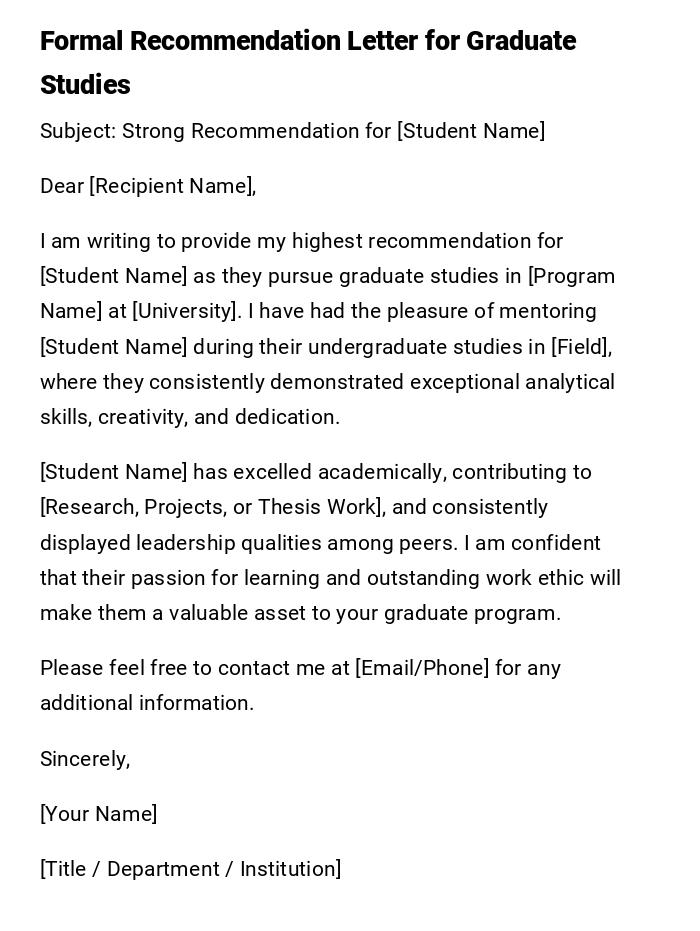
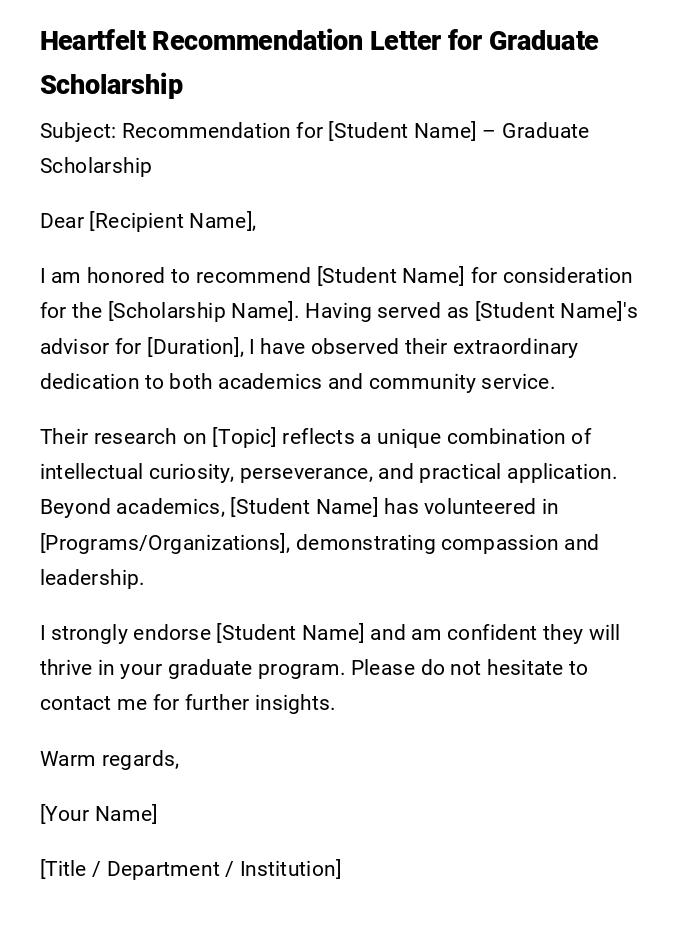
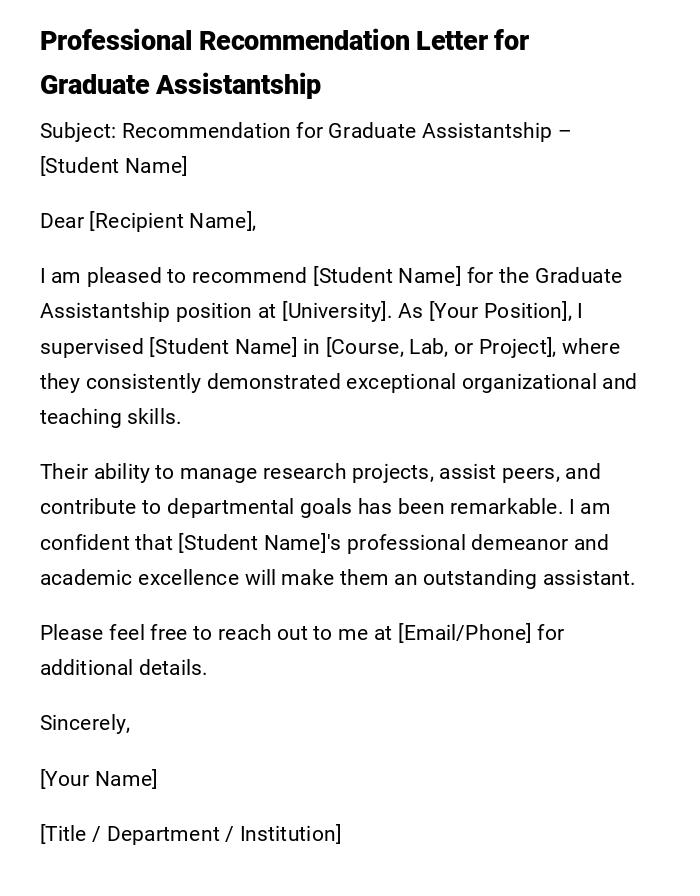
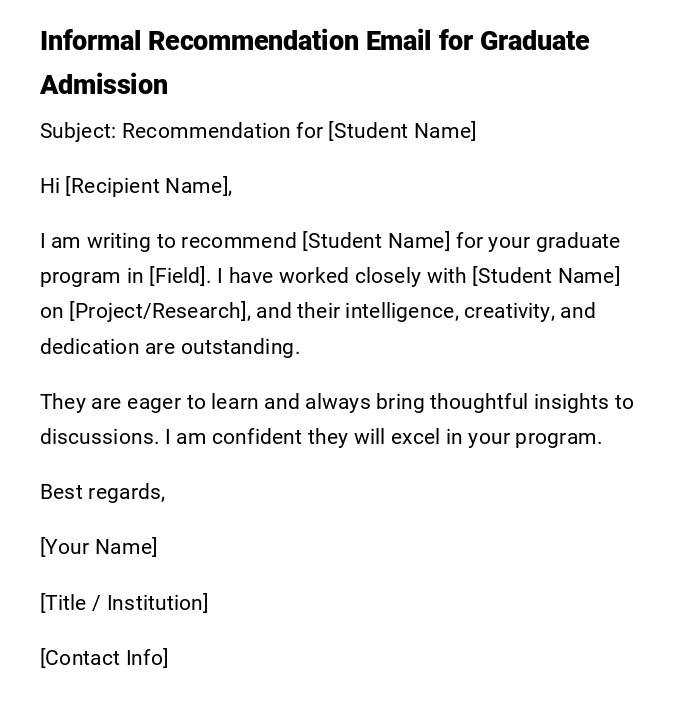
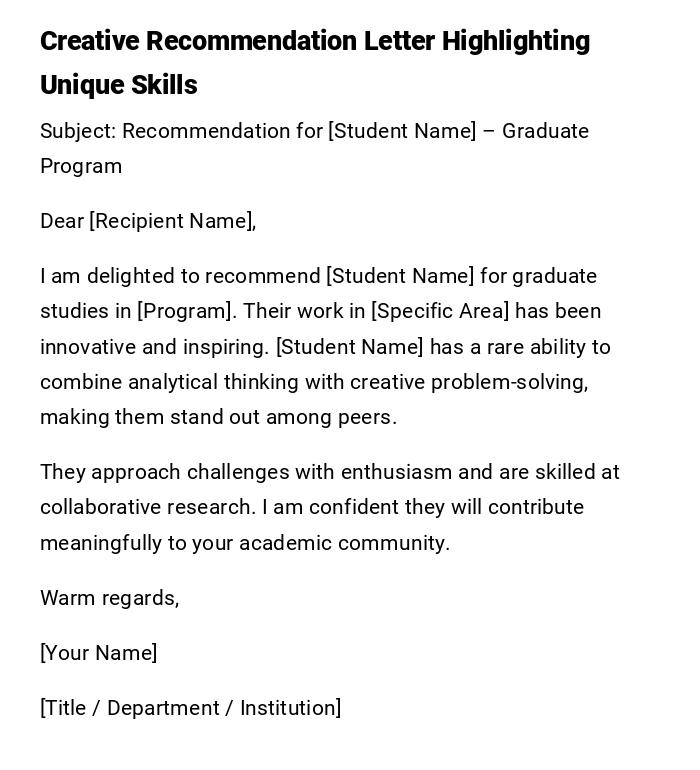
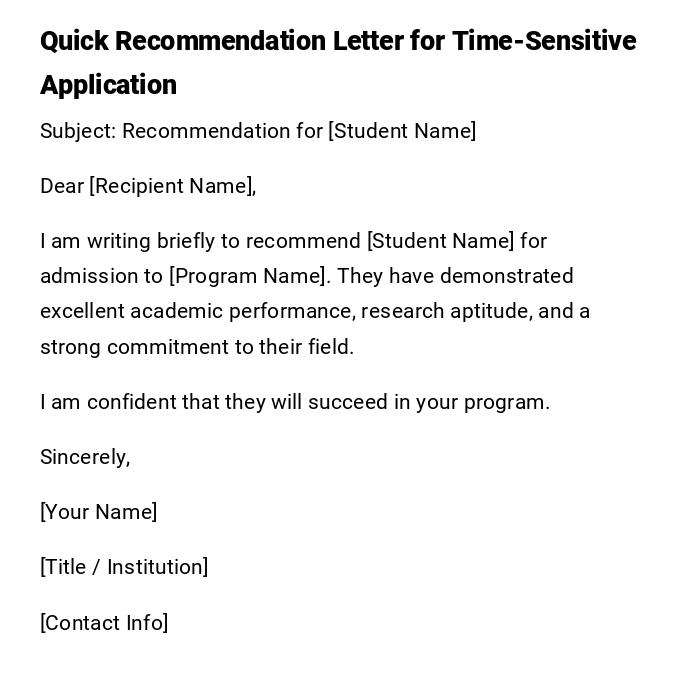
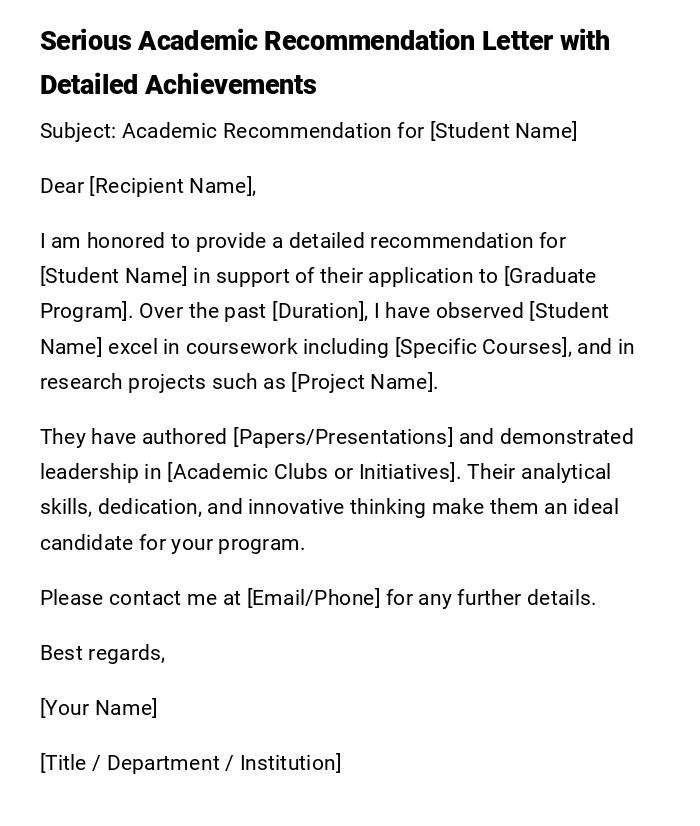

 Download Word Doc
Download Word Doc
 Download PDF
Download PDF